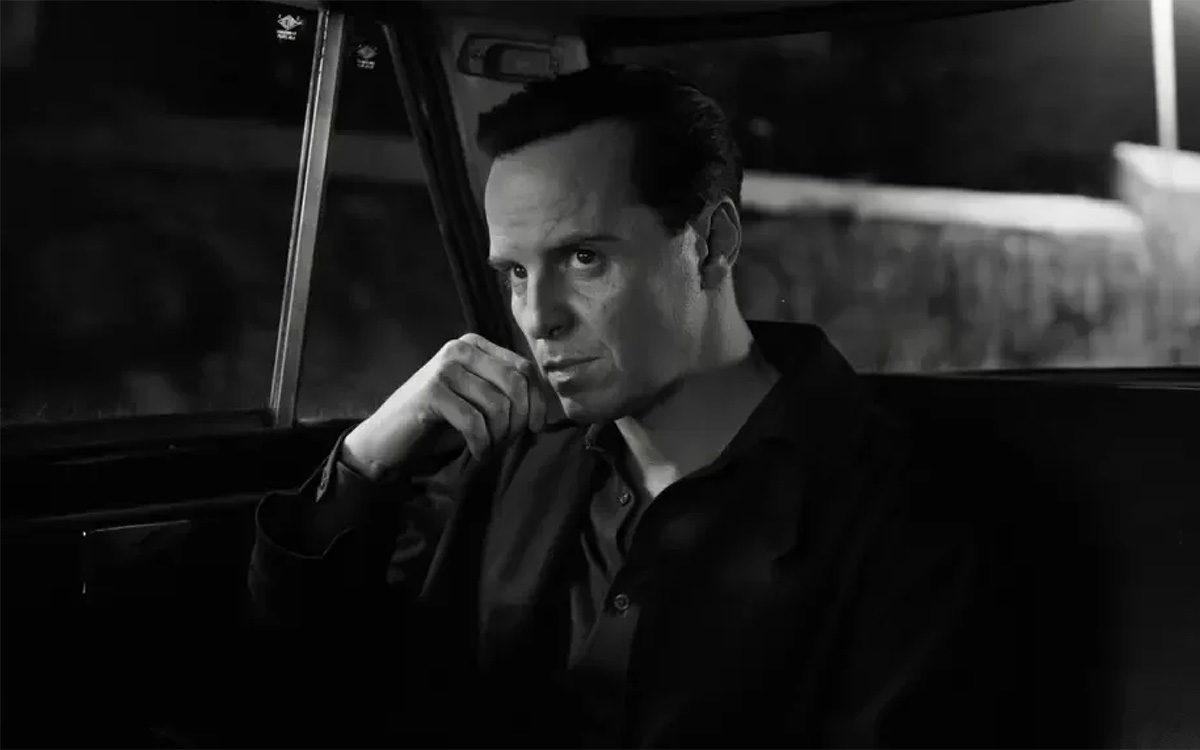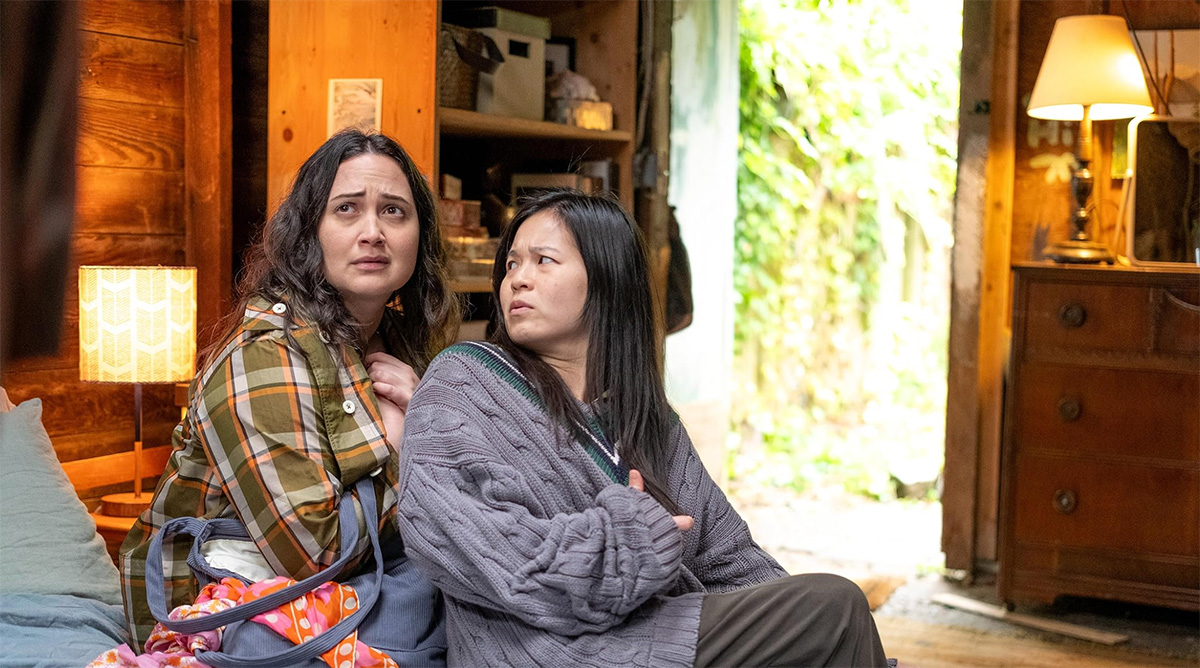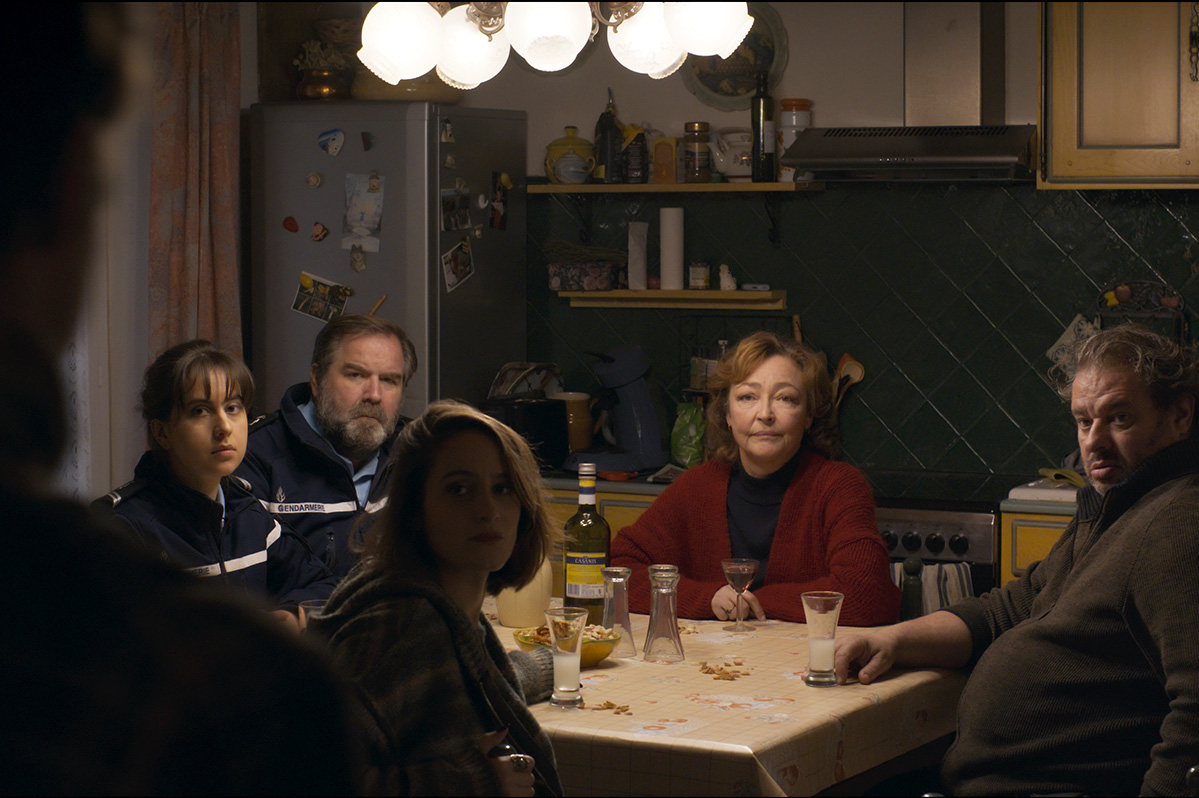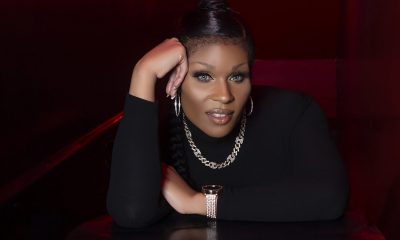Movies
Previewing queer movie and TV highlights for spring
New options coming despite recent Hollywood strikes

The Hollywood awards season has come to an end at last, which means we can finally look forward to some fresh new movies hitting screens over the next few weeks. And although the actors’ strike of 2023 has led to inevitable delays in bringing new content to our televisions for the spring, there are a few titles to watch for there, as well.
Girls 5Eva: Season 3 (March 14, Netflix)
The under-the-radar cult hit musical comedy series from Peacock, following a Y2K-era girl group that reunites to take advantage of a wave of millennial nostalgia, returns for a third season after being resurrected by Netflix. Lauded for its sharp and funny skewering of pop culture and the music industry and cut from the same zany, absurd cloth as “The Unbreakable Kimmy Schmidt” (much of its creative team are veterans of that hit show), it’s the kind of giddy-but-smart, rapid-fire comedy that begs to be binged. Starring Sara Bareilles, Busy Philipps, Renée Elise Goldsberry, and Paula Pell as a divorced lesbian dentist, fans will surely be logging on to watch as soon as it drops, but new viewers are encouraged to jump on board for this one, too.
Love Lies Bleeding (March 15, theaters)
Rumbling into theaters after an auspicious premiere at this year’s Sundance Festival, this pulpy 1980s-set lesbian-themed thriller from director Rose Glass (“Saint Maud”) is touted as “an electric new love story” and promises to take viewers on a wild ride with its story of a reclusive gym manager (Kristen Stewart) from a criminal family who falls in love with an aspiring bodybuilder (Katy O’Brian) on her way to Las Vegas to follow her dreams; unfortunately, their romance sparks unexpected violence, dragging the new lovers deep into a dangerous web of crime and intrigue. Though it was given limited release in New York and Los Angeles on March 8, it expands wide on March 15. Also starringJena Malone, Anna Baryshnikov, and Dave Franco, with Ed Harris as Stewart’s crime boss father. Consider it a must-see.
Femme (March 22/29, limited theaters with national expansion to follow)
From the UK comes this taut noir-ish thriller about a prominent London drag artist (Nathan Stewart-Jarrett) who, while stepping out one night after a show to buy cigarettes, is brutally attacked by a man (George MacKay) and his gang of friends. Left traumatized by the experience, he retreats into isolation – but when he recognizes his attacker in a chance meeting at a gay sauna, he begins an affair with the closeted bully, hoping to enact a plan of revenge. Co-writer/directors Sam H. Freeman and Ng Choon Ping developed the film as an expansion of their award-winning 2021 short film of the same name, and the resulting debut feature premiered to enthusiastic acclaim at the 2023 Berlin Film Festival. Also starring Aaron Heffernan, John McCrea, and Asha Reid.
Ripley (April 4, Netflix)
This long-awaited eight-episode limited series adapts lesbian literary icon Patricia Highsmith’s novel “The Talented Mr. Ripley” for yet another screen incarnation – there have been at least four so far, most famously the 1999 feature film version starring Matt Damon, Jude Law, and Gwyneth Paltrow – and stars queer Irish actor Andrew Scott (BBC’s “Sherlock”, “Pride”, “All of Us Strangers”) as the title character, who is sent by a wealthy man to persuade his son to return home from an extended trip to Italy. Once there, however, the ambitious Ripley finds himself irresistibly drawn into the privileged life of leisure led by young Dickie (Johnny Flynn) and his girlfriend Marge (Dakota Fanning), and he embarks into “a complex life of deceit, fraud and murder.” Shot in an elegant black and white that evokes its early 1960s setting, show creator/writer/director Steve Zaillian says his adaptation was crafted to provide an interpretation more faithful to the story and closer in tone to Highsmith’s novel than has been seen before, which is great news for fans of the original Ripley, whose adventures were continued by the late author throughout three further books after the success of the first, perhaps paving the way for follow-ups to this adaptation should it live up to the high expectations that accompany it. Eliot Sumner, Maurizio Lombardi, and John Malkovich also star.
Housekeeping for Beginners (April 5, limited theaters)
Another festival darling, this Macedonian film won the Queer Lion prize at Venice in 2023, and was submitted as an official selection for Best International Feature at the Academy Awards. While it didn’t make the cut for Oscar, it’s hitting US screens for a limited release next month – no doubt on the strength of writer/director Goran Stolevski’s previous feature, “Of An Age”, an Australian coming-of-age romance between two young men that made multiple “Best of the year” lists (including ours) in 2023. Revolving around a woman finds herself raising her girlfriend’s two troublemaking daughters despite having no interest in being a mother, the synopsis describes it as an exploration of “the universal truths of family,” framed in a “heartwarming story” of clashing wills “about an unlikely family’s struggle to stay together.” The pedigree alone is enough for us to suggest catching this one, if you can, when it hits theaters. Starring Anamaria Marinca, Alina Șerban, Samson Selim, Vladimir Tintor, Mia Mustafa, Džada Selim, Sara Klimoska, Rozafë Çelaj, Ajse Useini.
Glitter & Doom (April 9, digital)
Billed as “a fantastical queer romance set to the hit music of the Indigo Girls,” this indie oddball made a theatrical debut earlier this month, but heads to digital and VOD on April 9. It’s the “love at first sight journey” of its title characters, two young dreamers – an aspiring circus performer (Alex Diaz) and a struggling musician (Alan Cammish) – who embark on “an epic summer romance” until they find their love threatened by “the realities of pursuing their dreams.” Though we haven’t yet seen it ourselves, the buzz promises a campy yet uplifting and exuberant good time, and a star-studded queer-centric cast that includes Tig Notaro, Missi Pyle, Ming Na-Wen, Lea DeLaria, B-52s diva Kate Pierson, “Drag Race” alum Peppermint, Broadway star Beth Malone, and yes, even the Indigo Girls themselves.
Challengers (April 26, theaters)
From “Call Me By Your Name” director Luca Guadagnino comes this buzzy romantic triangle starring “Euphoria” and “Dune” star Zendaya as a former tennis prodigy turned coach whose husband – a champion on a losing streak (Mike Faist, “West Side Story”) – must face off against a washed-up former best friend (Josh O’Connor, “The Crown,” “God’s Own Country”) that also happens to be his wife’s former boyfriend. According to the synopsis, “pasts and presents collide and tensions run high,” and though details are scarce beyond the basics we’ve already shared, rumors (as well as a few not-so-subtle hints in the trailers) suggest that things might take a decidedly bisexual turn. Whether or not that should turn out to be true, Guadagnino’s name on the credits is enough reason to make this a queer must-see – especially with a cast as vibrant and talented as the one he has assembled.
I Saw the TV Glow (May 5, limited theaters)
Also coming from Sundance is this horror thriller from writer/director Jane Schoenbrun, produced by recent Oscar-winner Emma Stone (with husband Dave McCary) and starring queer actor Justice Smith and Brigette Lundy-Paine as two troubled teens who bond over a fantasy TV series and find their realities starting to blur after its cancellation. Praised by reviewers for its surreal style and its exploration of queer and trans themes within its mind-bending, darkly disorienting framework, it’s likely not the kind of movie that will resonate with all viewers – but it’s probably a great match for those who enjoy their horror on the abstract side.
In addition to all these, though their premiere dates are still not set, three much-loved TV series are set to return this spring. Streaming network Max will debut the third seasons of both Hacks and The Sex Lives of College Girls, two popular shows with heavy queer appeal. The former, starring Jean Smart and Hannah Einbinder, is a multi-award-winning comedy about the unlikely creative partnership between an old-school stand-up legend and an edgy young comedy writer who loathe each other – or at least did in the beginning. After two seasons of alternately awkward, bittersweet, and hilarious misadventures together, they might have warmed up to each other a bit, but we’re betting that won’t keep them from locking horns.
The latter, starring Renée Rapp, Pauline Chalamet, Alyah Chanelle, and Amrit Kaur, is also a comedy, following four freshman roommates at a fictional college as they explore love and friendship, financial stability and personal independence, and – of course – sex. It would have a draw for queer audiences even without the sapphic subplots, and for its enthusiastic fans, queer or otherwise, it will surely be a must watch.
Finally, the venerable UK sci-fi adventure series Dr. Who is set to return to the BBC sometime in May, when out queer actor of color Ncuti Gutwa (“Sex Education”, “Barbie”) officially becomes the 15th incarnation of the shape-shifting titular time lord – a role he already previewed to much fan approval in a Christmas special late last year. While the charms of this long-running fan franchise may escape viewers without an appreciation for the kind of campy intellectual fantasy that is its trademark appeal, Gutwa’s charmingly fabulous persona might be just the thing to bring a whole new army of queer converts into the fandom.
Movies
Heartfelt ‘Wedding Banquet’ remake a romcom worth seeing
Mishaps, crossed wires, conflicts are all part of the fun

Creating a worthy remake can be a tricky proposition, especially when the movie being remade is a beloved classic – but that doesn’t mean it’s an impossible one.
Consider Andrew Ahn’s new version of 1993’s “The Wedding Banquet,” a film that put future “Brokeback Mountain” director Ang Lee on the proverbial map in America, which opens in theaters this weekend after a debut at Sundance earlier this year. The original, an American/Taiwanese production which became a surprise hit in the U.S., broke ground with its story — a culture-clash comedy of manners about a queer romantic triangle attempting to stage a sham wedding, it was quickly embraced by LGBTQ audiences thrilled to see representation on the big screen – and positive representation, at that – in an era when it was even scarcer than it is today. To undertake a remake of such a film is a bold move, to say the least.
Yet gay Korean American writer/director Ahn (“Spa Night,” “Fire Island”) has built his blossoming career on films about queer relationships among Asian American characters, with as much (or more) emphasis on family, both biological and chosen, as on romantic partnership; It seems natural, perhaps, for him to reinterpret this influential classic through his own lens, and he’s already proven himself as a filmmaker whose strengths line up perfectly with the material.
Even so, Ahn hedges his bets, perhaps, by collaborating on the new screenplay with James Schamus, who also co-wrote the original (along with Lee and Neil Peng), and the result is a movie that – although it recrafts the original romcom for a newer age and reconfigures its central relationships a bit to “up the ante” on its complications – stays relatively faithful to the broad strokes of its plot.
In this iteration, the New York setting is transposed to Seattle, and the plot revolves around not just one queer romance, but two: Chris and Min (Bowen Yang and Han Gi-Chan), a stalled grad student and his South Korean boyfriend, and their lesbian friends-and-landladies Lee and Angela (Lily Gladstone and Kelly Marie Tran), who are struggling to become parents through expensive IVF treatments. Min, an artist whose temporary visa is about to expire, wants to stay with Chris and build a life in America, but his grandmother (Youn Yuh-jung) – currently running the vast family business empire to which he is heir – wants him to come home and claim his place in the organization. A wedding to Chris would secure him the green card he needs to defy his grandmother’s demands, but it would also mean outing himself as gay and potentially being cut off from his inheritance. As a solution, he offers to pay for Lee and Angela’s fertilization procedure in exchange for a “green card wedding” with the latter, ensuring that he can remain in the U.S. while also remaining in the closet to his family.
Of course it’s an idea as bad as it sounds, but despite some reticence, the couples agree to the plan; but when Grandmother decides to come to America and meet the bride in person, the four of them must attempt to pull off a masquerade that escalates far beyond their expectations after she insists on putting on a traditional – and elaborate – Korean wedding worthy of her grandson’s exalted status, all while wrestling with the ambivalence and doubts that begin to encroach on their relationships as the scheme begins to fray at the edges.
Those who’ve seen the original already know that things don’t play out exactly as planned – and anyone who hasn’t won’t be surprised when it doesn’t, anyway. We already told you it was a bad idea.
That, of course, is the charm of the romcom, a genre in which mishaps, crossed wires and conflicts are all part of the fun, and in any case it gives Ahn’s film the opportunity to explore – as Lee did with the original – the more serious and relatable challenges of reconciling our queerness with the deeply ingrained traditions of our cultural backgrounds; he does so with gentle wit and an equal measure of respect, but he’s not above getting laughs by pointing up the sheer absurdity that sometimes goes along with the process. Neither does he hesitate to delve into the messiness of queer relationships, even (and perhaps especially) with lifelong friends, or the deep insecurities and self-criticisms which get in the way of sorting them out.
To these ends, “Wedding Banquet” relies heavily on its cast, who embrace and clearly relish the chance to flesh out these characters. Yang brings his inevitable “SNL” star power to the table but downplays the wackiness in favor of a more nuanced tone, and Gi-Chan shines as his pragmatically idealistic partner; Gladstone’s intelligence and authenticity is a grounding force, while Tran counterpoints her with an eminently likable turn as her spunky-but-anxious misfit of a girlfriend – and the resonance they each bring to the prospect of motherhood highlights the longing for family and legacy that so many queer couples carry as they build their lives together.
It’s not all about the couples, though. Veteran Chinese American actress Joan Chen (“Tai Pan,” “Twin Peaks”) is a scene stealer as Angela’s hyper-supportive mom, whose participation in her daughter’s “lavender wedding” requires her to go against her deepest instincts as a proud ally, and Bobo Le provides a further connection to the theme of family with a charming performance as Yang’s tomboy-ish little sister. The anchoring performance, however, comes from acclaimed Korean star Yuh-jong, whose shrewd, savvy, and staunch portrayal of Gi-Chan’s power-player grandma adds a much-needed dose of level-headed wisdom into the midst of the whirlwind.
In the end, Ahn’s update of Lee’s classic comedy scores big points for honoring the original’s message of acceptance and embracing the notion of reimagining our traditional ideas about family structure to meet the needs of an ever-changing world; it also succeeds in maintaining a heartfelt sense of empathy for each of its characters, all of whom appeal to us precisely because of their imperfections and their hangups. None of them are perfect, but all of them are perfectly human, which goes a long way toward making Ahn’s remake feel like more than just the slickly-made feel-good romcom it resembles.
And yet, given the screwball potential and the endless possibilities for farcical developments in the convoluted deception attempted by its sets of lovers, Ahn’s “Wedding Banquet” could have been funnier. Leaning into an idealized and sentimental perspective as it gracefully brings its characters’ lives into place, it occasionally feels a bit “precious,” too “Hollywood” to be believed.
Again, however, this is part of the charm of the romcom: if generations of straight audiences have gotten the chance to buy into idealized big screen fantasies about life and love, then why shouldn’t we enjoy the same privilege?
With that in mind, “The Wedding Banquet” makes for a perfect opportunity to entertain and validate ourselves – and even if it doesn’t tickle your funny bone, it’s a generous enough feast for your queer soul that it deserves you to see it.
Just make sure you bring somebody special to share your popcorn with.
Movies
An ‘Indian Boy’ challenges family tradition in sweet romcom
Refreshing look at what is possible when a family is willing to make changes

For queer audiences hungry for representation, nothing says “I feel seen” quite as much as a good queer romcom.
Perhaps it’s because love stories are universal, differing from culture to culture in the surface details only, and therefore have the potential for helping straight audiences understand a different kind of love a little better; or perhaps, in seeing our kind of love displayed so publicly, we feel a sense of validation. Whatever the reason, it rings our bell.
Maybe that’s why the quest for the first “great gay romcom” has continued to be a driving factor in the ongoing history of queer cinema, setting up an expectation in the mainstream that has, perhaps inevitably, fallen short of creating it. Fortunately, there are some efforts that have risen above the pressure to simply be what they are, instead of being the answer to everybody’s prayers for acceptance, and in so doing have managed to come close.
“A Nice Indian Boy” is just that kind of movie. Adapted from a play by Madhuri Sheka (by Eric Randall, whose screenplay made Hollywood’s buzzy “Black List” of un-produced scripts in 2021) and directed by Canadian-born Indian filmmaker Roshan Sethi, it might come closer to presenting an entirely successful gay romcom than most of the other overthought efforts that have come before.
It centers on Naveen (Karan Soni), a 30-something gay doctor, whose South Asian Indian family has long since accepted and supported his orientation but still struggles to reconcile it with their traditional beliefs. Enter Jay (Jonathan Groff), a white freelance photographer who grew up as an adoptee to Indian parents, and of course it’s love at first sight. A whirlwind courtship leads to a proposal, but there are a lot of considerations that must be met before the smitten couple can achieve the “big Indian wedding” of their dreams. The one that looms largest is gaining the approval of Naveen’s progressive-but-devout Hindu parents (Harish Patel and Zarna Garg) – not to mention his discontented sister (Sunita Mani) – whose confusion over his new fiancé’s ethnicity is just one of many obstacles they face in making their dream nuptials a reality. Intensifying that challenge – frequently to comedic effect – is Naveen’s struggle with his own insecurities, which threaten to derail not only the wedding plans but his relationship with the emotionally open and unreservedly passionate Jay, too.
It’s a sweet and clearly heartfelt affair, with a few laugh-out-loud moments to be found, as well as the wry introspection of its neurotic lead character, whose self-questioning turmoils feel like a connecting thread to the work of Woody Allen – indeed, “Annie Hall” is even name-dropped in the film, suggesting a spirit of homage that can be traced in a reflection of that classic Oscar-winner’s title character through Jay’s quirkily unconventional personality.
At the same time, the movie marries its diverse cultural influences by drawing just as heavily from a love of “Bollywood” cinema, and one of its movies in particular, which both of its protagonists adore. That allows it to maintain an aura of lush, larger-than-life romanticism that counterpoints the amusingly endearing self-deprecation of its main protagonist; it also reflects in the movie’s colorful, lively visual aesthetic and its choice to share focus on an entire family of characters for a more sweeping perspective.
As for its handling of the subject of race, despite its clear (and queer) twist on the “Guess Who’s Coming to Dinner?” trope of a family’s surprise over a bi-ethnic romance in its midst, “Indian Boy” doesn’t spend much time worrying about a love connection shared across racial divides; and while it gets considerable comic mileage out of Naveen’s parents’ well-intentioned but clueless efforts to show their acceptance of their gay son, the queerness of his relationship is not really an issue in itself. Rather, the conflict comes – for all of the movie’s primary characters, not just for the couple in the middle – from the difficulty of finding harmony between old customs and a new world that no longer fits within their boundaries.
Admittedly, Sethi’s movie sometimes feels a little too sentimental to be believed; it paints an aspirational picture – a true-love romance between a successful doctor and a rising artist – and tugs even harder on our heartstrings with its depictions of clumsy-but-sincere acceptance from the family around them; and while we don’t want to spoil any surprises, when it comes time for the big finale, it pulls out all the feel-good stops. Cynics in the audience might fail to be as enchanted as it wants them to be.
And yet, it all works wonderfully, largely because of its cast. Soni and Groff have an instantly tangible chemistry, and their differing personalities complement each other perfectly. Individually, they take us with them on their personal journeys with just as much clarity and conviction, and the movie would fall flat without the strength of their performances at its core.
Equally superb, however, are Patel and Garg, whose discomfort over the preparations for their son’s wedding never feel like they come from anywhere but love and a desire to share in his happiness; and Suri, whose considerable comedic talents contrast to great effect with the brewing discord within her character, lends a much-needed weight to the mix while still managing to glow alongside all her costars.
Combined with the sharp, funny, and insightful script and the generosity of Sethi’s directorial approach, which frames each character with respect and import to the story, it all makes “A Nice Indian Boy” a nice crowd-pleasing movie to see. It may or may not be “the great gay romcom,” and it might all seem a bit too glossy and perfect for some viewers’ taste – but it offers a refreshing look at what is possible when a family is willing to make changes in their way of life simply for the sake of love. What message could be more positive than that?
“A Nice Indian Boy” is now playing in theaters.
Movies
Sexy small town secrets surface in twisty French ‘Misericordia’
A deliciously depraved story with finely orchestrated tension

The name Alain Guiraudie might not be familiar to most Americans, but if you mention “Stranger by the Lake,” fans of great cinema (and especially great queer cinema) are sure to recognize it immediately as the title of the French filmmaker’s most successful work to date.
The 2013 thriller, which earned a place in that year’s “Un Certain Regard” section of the Cannes Film Festival and went on to become an international success, mesmerized audiences with its tense and erotically charged tale of dangerous attraction between two cruisers at a gay beach, one of whom may or may not be a murderer. Taut, mysterious, and transgressively explicit, its Hitchcockian blend of suspense, romance, and provocative psychological exploration made for a dark but irresistibly sexy thrill ride that was a hit with both critics and audiences alike.
In the decade since, he’s continued to create masterful films in Europe, becoming a favorite not only at Cannes but other prestigious international festivals. His movies, each in their own way, have continued to elaborate on similar themes about the intertwined impulses of desire, fear, and violence, and his most recent work – “Misericordia,” which began a national rollout in U.S. theaters last weekend – is no exception; in fact, it draws all the familiar threads together to create something that feels like an answer to the questions he’s been raising throughout his career. To reach it, however, he concocts a story of small town secrets and hidden connections so twisted that it leaves a whole array of other questions in its wake.
It centers on Jérémie (Félix Kysyl), an unemployed baker who returns to the woodsy rustic village where he spent his youth for the funeral of his former boss and mentor. Welcomed into the dead man’s home by his widow, Martine (Catherine Frot), the visitor decides to extend his stay as he reconnects to his old home town and his memories. His lingering presence, however, triggers jealousy and suspicion from her son – and his own former school chum – Vincent (Jean-Baptiste Durand), who fears he has ulterior motives, while his sudden interest in another old acquaintance, Walter (David Ayala), only seems to make matters worse. It doesn’t take long before circumstances erupt into a violent confrontation, enmeshing Jérémie in a convoluted web of danger and deception that somehow seems rooted in the unspoken feelings and hidden relationships of his past.
The hard thing in writing about a movie like “Misericordia” is that there’s really not much one can reveal without spoiling some of its mysteries. To discuss its plot in detail, or even address some of the deeper issues that drive it, is nearly impossible without giving away too much. That’s because it’s a movie that, like “Stranger by the Lake” and much of Guiraudie’s other work, hinges as much on what we don’t know as what we do. Indeed, in its earlier scenes, we are unsure even of the relationships between its characters. We have a sense that Jérémie is perhaps a returning prodigal son, that Vincent might be his brother, or a former lover, or both, and that’s just stating the most obvious ambiguities. Some of these cloudy details are made clear, while others are not, though several implied probabilities emerge with a little skill at reading between the lines; it hardly matters, really, because as the story proceeds, new shocks and surprises come our way which create new mysteries to replace the others – and it’s all on shaky ground to begin with, because despite his status as the film’s de facto protagonist, we are never really sure what Jérémie’s real intentions are, let alone whether they are good or bad.
That’s not sloppy writing, though – it’s carefully crafted design. By keeping so much of the movie’s “backstory” shrouded in loaded silence, Guiraudie – who also wrote the screenplay – reminds us that we can never truly know what is in someone else’s head (or our own, for that matter), underscoring the inevitable risk that comes with any relationship – especially when our passions overcome our better judgment. It’s the same grim theme that was at the dark heart of “Stranger,” given a (slightly) less macabre treatment, perhaps, but nevertheless there to make us ponder just how far we are willing to place ourselves in danger for the sake of getting what – or who – we desire.
As for who desires what in “Misericordia,” that’s often as much of a mystery as everything else in this seemingly sleepy little village. Throughout the film, the sparks that fly between its people often carry mixed signals. Sex and hostility seem locked in an uncertain dance, and it’s as hard for the audience to know which will take the lead as it is for the characters – and if the conflicting tone of the subtext isn’t enough to make one wonder just how sexually adventurous (and fluid) these randy villagers really are beneath their polite and provincial exteriors, the unexpected liaisons that occur along the way should leave no doubt.
Yet for all its murky morality and guilty secrets, and despite its ominous motif of evil lurking behind a wholesome small-town surface, Guiraudie’s pastoral film noir goes beyond all that to find a surprisingly humane layer rising above it all, for which the town’s seemingly omnipresent priest (Jacques Develay) emerges to highlight in the film’s third act – though to reveal more about that (or about him) would be one of those spoilers we like to avoid.
There’s a clue to be found, however, in the film’s very title, which in Catholic tradition refers to the merciful compassion of God for the suffering of humanity, but can be literally translated simply as “mercy.” Though it spends much of its time illuminating the sordid details of private human behavior, and though the journey it takes is often quite harrowing, “Misericordia” has an open heart for all of its broken, stunted, and even toxic characters; Guiraudie treats them not as heroes or villains, but as flawed, confused, and entirely relatable human beings. In the end, we may not know all of their dirty secrets, we feel like we know them – and in knowing them can find a share of that all-forgiving mercy for even the worst of them.
It’s worth mentioning that it’s also a movie with a lot of humor, brimming with comically absurd character moments that somehow remind us of our own foibles even as we laugh at theirs. The cast, led by the opaquely sincere Kysyl and the delicately provocative Frot, forge a perfect ensemble to create the playful-yet-gripping tone of ambiguity – moral, sexual, and otherwise – that’s essential in making Guiraudie’s sly and ultimately wise observations about humanity come across.
And come across they do – but what makes “Misericordia” truly resonate is that they never overshadow its deliciously depraved story, nor dilute the finely orchestrated tension his film maintains to keep your heart pounding as you take it all in.
To tell the truth, we already want to watch it again.




















